Aye, it is very probable that without Stalin, the totalitarian machinery would have broken down, as there was no successor for him. NKVD, the Party, Red Army, State apparatus, were all separate institutions and all had ambitious men in top positions would have vied for Stalin's place even after the Purges.
- Home
- Forums
- Miscellaneous
- The Anachronist's Guild - Off-Topic Chat
- The Sage's Guild - Historical Discussion
You are using an out of date browser. It may not display this or other websites correctly.
You should upgrade or use an alternative browser.
You should upgrade or use an alternative browser.
worst strategic decision / mistake
- Thread starter Amman d Stazia
- Start date
Users who are viewing this thread
Total: 2 (members: 0, guests: 2)
It is possible, but think what a blow that might have been to the war effort anyway. Not that people were following his inspiration (more provoked forward by his terror), but it would be a huge blow to whatever prestige he had if he retreated when in 1941 all the Russians were being ordered to do is hold on stubbornly to all ground. As Jhessail said, perhaps its most critical role was as a communications hub, especially considering its central location (its loss might not only have crippled the center of the front but also isolated the north and south from each other).
As for the German Staff Officers, I am sure there is an element of both points you suggest Jhessail...that of passing the buck (human nature to do so) and also to distance themselves from that horrible regime. That being said, I think that is a minor part compared to the part Hitler did play in it. I was just reading recently about the push towards Leningrad in '41 and how in the Baltic states several times Hitler personally ordered that certain mechanized units hold up their advance for the infantry to catch up, thereby losing opportunities to really make a major breakthrough (and delaying the advance for days and in some cases a week or two, which in hindsight we know would have been very important for taking Moscow).
However, generally speaking the German Staff Officers were indeed the best (in my opinion of course, but I know it is widely accepted by many too), both due to their thorough and pragmatic training but also their ability to make mistakes and not be sacked. Russia was notorious for sacking and often imprisoning or executing officers who made mistakes, especially in '41 and '42. The United States was not much better, typical of our media culture here we often have to find simplistic causes for a failure and typically this is a scapegoat leader (still seen today both with generals, CEO's, and Presidents too). Although not as bad, the British also had some of this as well. The Germans, on the other hand, were apt to forgive mistakes if they were not a result of negligence, which would allow the general who would have been sacked in another country to learn from their mistakes and be better for it.
Btw Jhessail, that picture you posted freaked me out a little. I can't decide if it is the spawn of the Joker or Cheshire Cat...or maybe both....
As for the German Staff Officers, I am sure there is an element of both points you suggest Jhessail...that of passing the buck (human nature to do so) and also to distance themselves from that horrible regime. That being said, I think that is a minor part compared to the part Hitler did play in it. I was just reading recently about the push towards Leningrad in '41 and how in the Baltic states several times Hitler personally ordered that certain mechanized units hold up their advance for the infantry to catch up, thereby losing opportunities to really make a major breakthrough (and delaying the advance for days and in some cases a week or two, which in hindsight we know would have been very important for taking Moscow).
However, generally speaking the German Staff Officers were indeed the best (in my opinion of course, but I know it is widely accepted by many too), both due to their thorough and pragmatic training but also their ability to make mistakes and not be sacked. Russia was notorious for sacking and often imprisoning or executing officers who made mistakes, especially in '41 and '42. The United States was not much better, typical of our media culture here we often have to find simplistic causes for a failure and typically this is a scapegoat leader (still seen today both with generals, CEO's, and Presidents too). Although not as bad, the British also had some of this as well. The Germans, on the other hand, were apt to forgive mistakes if they were not a result of negligence, which would allow the general who would have been sacked in another country to learn from their mistakes and be better for it.
Btw Jhessail, that picture you posted freaked me out a little. I can't decide if it is the spawn of the Joker or Cheshire Cat...or maybe both....
It's the epilepsy-version of the Overly Attached Girlfriend. 

I do agree that the German general staff were probably the best in their business. I actually had a conversation about -roughly- this on Christmas Day when I met with few other postgrads in my uni and we talked about how Germany, in both World Wars, almost fought with one hand tied behind her back. In the Great War it was because of the lack of central leadership and unity which meant that Germany wasn't economically or industrially as proficient as she could have been. In the Second World War, it was the Byzantine power structures of the Third Reich, coupled with the industrial inefficiencies, like not mobilizing women to the industry and not even putting the industry to war-footing until 1941/42 - and they still came very close to winning both wars even against superior (numerically and industrially) alliances arrayed against them.

I do agree that the German general staff were probably the best in their business. I actually had a conversation about -roughly- this on Christmas Day when I met with few other postgrads in my uni and we talked about how Germany, in both World Wars, almost fought with one hand tied behind her back. In the Great War it was because of the lack of central leadership and unity which meant that Germany wasn't economically or industrially as proficient as she could have been. In the Second World War, it was the Byzantine power structures of the Third Reich, coupled with the industrial inefficiencies, like not mobilizing women to the industry and not even putting the industry to war-footing until 1941/42 - and they still came very close to winning both wars even against superior (numerically and industrially) alliances arrayed against them.
Amman d Stazia
Master Knight

the mistake was British, and the consequences fall on the UK
worst strategic decision / mistake? .... inventing these!
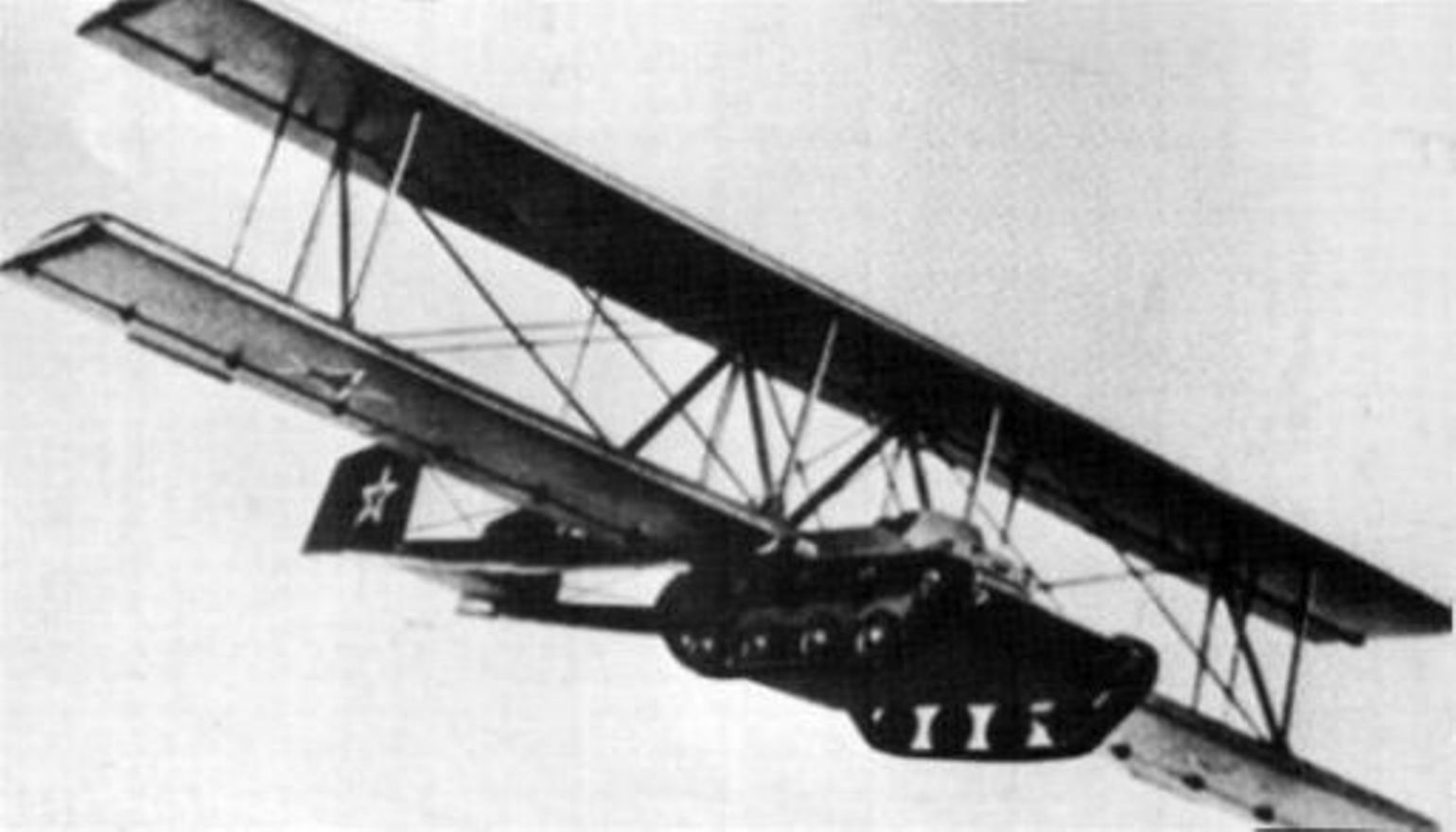
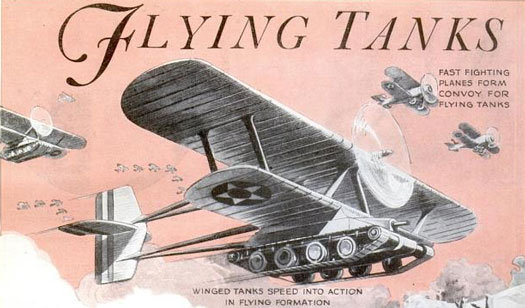
















As Austupaio said, the benefits of giving armor the ability to air drop behind enemy lines is incredibly valuable.
And if they actually got that to work it'd be freaking kick ass.
And if they actually got that to work it'd be freaking kick ass.
Lord Burgess1
They had glider borne tanks, but they were not much more than a tankette and had 2pdr or equivalent guns on them.
Arrakhis
Knight

That's actually a pretty cool drawing. Especially with those figures on the top left looking at Cortez and Montezuma there.Hengwulf said:"Welcome dear friends, please have some gold"

Arrakhis said:
Yeah...except that only some sources claimed the ice ever broke, namely Russian sources (I guess to give a divine intervention flavor to it). The reality is that in Russia and the eastern Baltic, rivers and lakes froze so solid that they were often traversed upon. For example, the Teutonic Knights campaigned often during the winter in order to use frozen rivers as highways into the deep (and otherwise inaccessable) forests of Samogitia and western Lithuania. It worked very well and they did it for nearly two hundred years. Keep in mind during this time the world was undergoing a drop in average temperature.
The Russians pursued the enemy all the way back across the lake. Neither the Livonian Rhymed Chronicle nor the First Novgorodian Chronicle mention the ice breaking. The image of men falling through ice probably originated in the 16th century manuscript "The Life of Aleksandr Nevskiy" (Житие Александра Невского). Eisenstein naturally seized the opportunity in his film and showed us that glorious image of men in cloaks and cardboard helmets "drowning" in four feet of water on a sound stage.
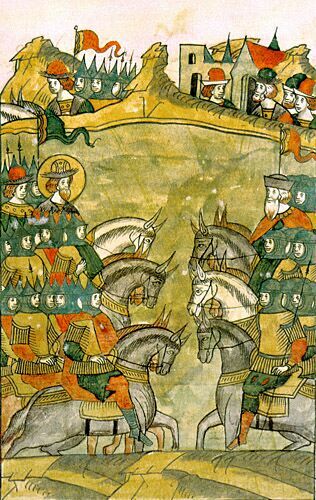
The meeting of Russian and German forces
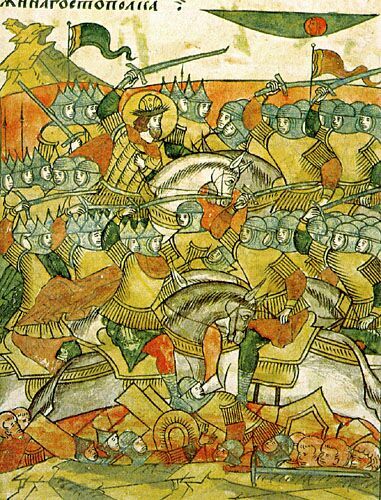
The battle on the ice
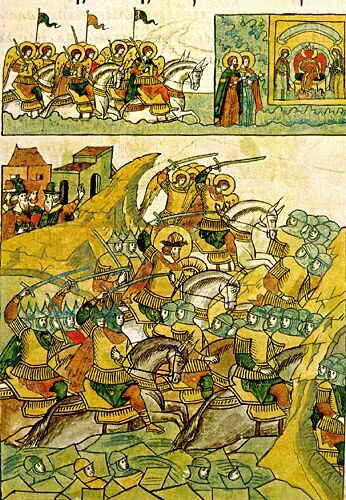
The flight of the Germans, and the vision of a heavenly army.
Notice that in the second image here, there are both Russians and Germans (et alii) in the water, yet in the next image the Russians drowning are missing.
The lake itself however usually does not freeze flatly, from heavy headwinds, so it forms a harshly jagged surface of stacked sheets that melt and refreeze over each other. If the Crusaders and their allies made a tactical error regarding the site of the engagement, it would be charging across that surface in tight formation where a tripped hoof could complicate the whole formation. Beyond that, Hermann's error was simply underestimating the enemy's number and allowing himself to be enveloped.

The meeting of Russian and German forces

The battle on the ice

The flight of the Germans, and the vision of a heavenly army.
The lake itself however usually does not freeze flatly, from heavy headwinds, so it forms a harshly jagged surface of stacked sheets that melt and refreeze over each other. If the Crusaders and their allies made a tactical error regarding the site of the engagement, it would be charging across that surface in tight formation where a tripped hoof could complicate the whole formation. Beyond that, Hermann's error was simply underestimating the enemy's number and allowing himself to be enveloped.
Yes, thank you Bluehawk, that info sits right in line with what I remember reading. Also, what you mention about the ice not freezing flatly also was in my memory but I didn't want to say anything about it since I wasn't 100% sure my memory was correct. However, from what I remember reading is that the far eastern bank (where the Novgorod army was) had ice almost in a way to look like they were frozen waves (probably meaning that jagged layer effect looking like a cresting wave), making an excellent defensive position even better. I can't imagine it would be easy riding or walking over such an ice obstacle. Not sure if that sort of ice was all over their position or on just one flank or so, still interesting either way.
As for the actual battle, I think they relied too much on their local levies's resolve. If I remember it correctly, they broke (which is common for levy troops anywhere in Europe) and that allowed the Novgorod army to envelope the remaining Crusader force. Also, keep in mind that the army was lead by the Bishop of Dorpat, a regular clergyman (of the German fighting clergy type found in the period) and not the Teutonic Order, they just made up a part of the army.
As for the actual battle, I think they relied too much on their local levies's resolve. If I remember it correctly, they broke (which is common for levy troops anywhere in Europe) and that allowed the Novgorod army to envelope the remaining Crusader force. Also, keep in mind that the army was lead by the Bishop of Dorpat, a regular clergyman (of the German fighting clergy type found in the period) and not the Teutonic Order, they just made up a part of the army.
The strategy of the bulgarian czar Ferdinand during the second Balkan War. Basically, after he captured most of Thrace, he decided ''**** dis shyte, warzz!1'' and all hell let loose vs Serbia, main reason being Macedonia. Yeah, but the serbs signed a secret treaty with Greece, guarantiing that they will help eachother. So far 2v1. The Ottoman Empire decided to tale back southern Thrace. 3v1. Finally, Rumania wanted southern Dobrudzha, making it a 4v1 gangbang. This led to Bulgaria joining Germany in both World Wars with the hope to regain lost lands.
GoblinOverlord
Squire

Publius Quintilius Varus' stupid policy against the German peoplke he governed, which was followed by the massacre of three Roman legions (+/- 21.000 men) plus camp followers in the Teutoburger Forest. 
Similar threads
- Replies
- 2
- Views
- 73
- Replies
- 6
- Views
- 351











